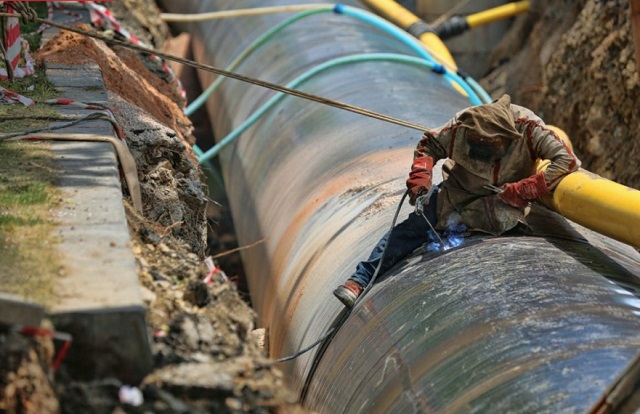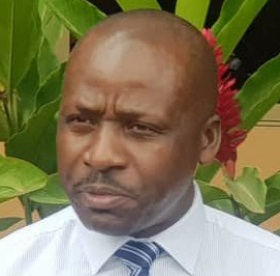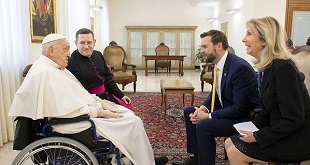
‘It’s engagement with the EU, not insults that will unlockUganda Oil project’
Kampala, Uganda | RONALD MUSOKE | As the fallout from the “emergency resolution” passed on Sept.15 by the European Parliament continues to rattle sections of Ugandans, one of the local civil society organisations that track developments in Uganda’s oil and gas sector says “It is constructive engagement with the European Union (EU) and not insults that will drive the project forward.”
“We believe that the government should engage the EU because they are Uganda’s development partners. We want to borrow close to US$20bn from their banks; TotalEnergies is a European company and there is no way we are going to escape their influence on this oil project,” said Dickens Kamugisha, the Chief Executive Officer of the African Institute for Energy Governance (AFIEGO), a local civil society organisation.
Kamugisha was speaking on Sept.29, just a few hours after AFIEGO was awarded the 2022 Right to Livelihood accolade by the Swedish based organisation, Right Livelihood, which works to illuminate the voices of change makers around the world.
“For the work that we do here in Uganda, you need to be encouraged, you need to be motivated. We face a very hostile environment, including arrests. When the government knows that there are people around the world who appreciate our work, they think twice about attacking us or our communities. So this Award means that we can help many more communities,” said Kamugisha.
Kamugisha added: “We are not an oil company, we are not government, we do not have a police force and we don’t have money; our work is to give information to the public and the public should be the one to put pressure on their government.”
‘Shallow and egocentric’ EU MPs
While launching the 7th Uganda International Oil and Gas Summit in Kampala on Sept.27, President Yoweri Museveni referred to the EU MPs as “so shallow, so egocentric, so wrong, yet (they) broadcast their ignorance all over the place.”
“These (EU) MPs are young girls and should not lecture me on what to do in Uganda. They should calm down, somebody should counsel them,” Museveni said. He said Uganda’s oil project will proceed as scheduled and he hopes the oil development partners (TotalEnergies and CNOOC) will join Uganda firmly.
Obnoxious resolution
On Sept.15, the European Parliament passed an “emergency resolution” by a large majority denouncing the consequences of Uganda’s oil projects— specifically Tilenga and the East African Crude Oil Pipeline (EACOP).
The EU Parliament called for halting of drilling activities in the protected and sensitive ecosystem (Murchison Falls National Park) and postponement of work on the EACOP for at least one year to study the feasibility of an alternative route that would preserve the environment and consider other projects based on renewable energy.
The MPs also called for an end to human rights violations, including the immediate release of human rights defenders arrested in an arbitrary manner. They also called for prompt, fair and adequate compensation for those expropriated or deprived of access to their land by the EACOP project.
The resolution has since riled the government and two demonstrations, including one organised by a students’ union have taken place near the offices of the European Union Delegation in Kampala.
On the same day the EU issued its resolution, Thomas Tayebwa, the Deputy Speaker of Uganda’s 11th Parliament read a statement in Parliament condemning the EU Parliament. Tayebwa said the EU resolution was based on “misinformation and deliberate misrepresentation of key facts on environment and human rights protection.”
“It represents the highest level of neo-colonialism and imperialism against the sovereignty of Uganda and Tanzania. This motion seeks to curtail the progress of Uganda’s oil and gas developments and extension, the country’s socio-economic growth and development.” He said the EU motion seems premised on allegations of potential environmental impacts, human rights abuses and climate change targets.
“It’s imprudent to say that Uganda’s oil projects will exacerbate climate change, yet it is a fact that the EU bloc with only 10% of the world’s population is responsible for 25% of global emissions, and Africa with 20% of the world’s population is responsible for 3% of emissions.”
Tayebwa said since it is the EU and other western countries which are historically responsible for climate change, it is certainly not Africa or Uganda that should stop or slow down on development of natural resources.
On compensation of project affected persons in the Albertine region, Tayebwa noted that over 70% of the people affected by land acquisition for the projects have been compensated or settled and are undergoing training on livelihood improvement projects in agriculture, financial literacy, and vocational skills, among others.
“Efforts to fully compensate all project affected persons are ongoing, with cooperation from the local communities and leaders. Land is not utilized by the projects before the compensation processes are concluded, and any related grievances are addressed through a participatory process.”

But Dickens Kamugisha appeared to back the EU resolution insisting that the oil project is fraught with governance issues; including long and winding processes regarding compensation, governance, and harassment of civil society and human rights groups.
“It’s not about saying we are going to continue, the issue is, are we doing the right thing? If there are things that are not going on well, how do we ensure that those issues are addressed? That should be right approach.”
“If they (EU) say the government harasses civil society and human rights groups, don’t we know that the government has been doing so?” Kamugisha said.
AFIEGO’s work has in recent years drawn severe backlash from the government, resulting in threats and harassment, including arrests and detentions, against its staff. Yet, despite this, the civil society group
continues to fight for environmental protection and the well-being of affected communities using innovative legal methods and the creation of space for civil society voices.
Using advocacy, media campaigns, and legal action, AFIEGO says it has stood with communities to oppose extractive projects seeking to exploit Uganda’s oil reserves discovered in 2006.
Kamugisha talks about the frustration that project affected people in Bunyoro and Amuru in the north of the country have endured since they were told that part of their land is going to be used for oil projects. For some of these people, it was way back in 2012 but up to now, they are yet to find redress.
“Where they are building an airport (Kabaale International Airport) in Hoima, over 7000 people were displaced including 3500 women in 2012. The aggrieved people filed a case for redress in 2014 but up to now, that case has never been resolved. By the time they get compensated, do you know what the impacts on their livelihood?”
In 2019, almost 3900 households were given notice that some portions of their land would be taken up by the EACOP project after being compensated. However, Kamugisha says, following the valuation of their pieces of land, the people were told not to do any long term development such as building houses, planting trees. Some are still waiting up to now and many are frustrated and have become desperate.
“That is why we insist that whatever is being planned, and whatever decisions are being made today; we need to be very careful because we have seen that oil in Africa leads to many problems instead of benefits,” Kamugisha says.
“If you look at a country like Uganda with its high levels of corruption, you look at its conservation institutions such as the National Environment Management Authority (NEMA) and the National Forestry Authority (NFA), you don’t see that you can start oil activities today and you survive as a country.”
“It’s not AFIEGO or its partners saying Uganda should not exploit its oil; we are saying whatever the government is doing, they must look critically at the impacts of the industry on the communities.”
AFIEGO says the discovery of oil reserves has led to an increase in land grabs, illegal displacement and environmental degradation in the past decade. Through gathering evidence to be used in court cases and drawing attention to the impact of the planned pipeline on local communities, AFIEGO has been instrumental in creating international pressure to stop the construction.
Kamugisha says there is plenty evidence from oil producing countries across Africa which shows that governments never do what they promise to do when oil production starts. “When they say the oil will be used to generate revenue, fight energy poverty, they never actually realise all these benefits,” he says.
In awarding AFIEGO this year’s prize, Right Livelihood’s jury noted that AFIEGO was receiving the award “for their courageous work for climate justice and community rights violated by extractives energy projects in Uganda.”
“In the face of the global climate crisis, AFIEGO stands with communities against oil and gas exploitation projects,” said Ole von Uexkull, the Executive Director at Right Livelihood.
“Resisting government and corporate threats, the organisation ensures that communities affected by colonialist extractive energy projects can raise their voices on national and international levels. With their bottom-up work at the intersection of societal, economic and environmental concerns, AFIEGO models a democratic and renewable energy path for African countries.”
****
 The Independent Uganda: You get the Truth we Pay the Price
The Independent Uganda: You get the Truth we Pay the Price




It is not surprising that Dickens Kamugisha is on the side of the EU parliamentarians on this one.He is speaking in defense of euros that are rolling into his organisation and to be a contrarian will mean the closing down of the euros tap.